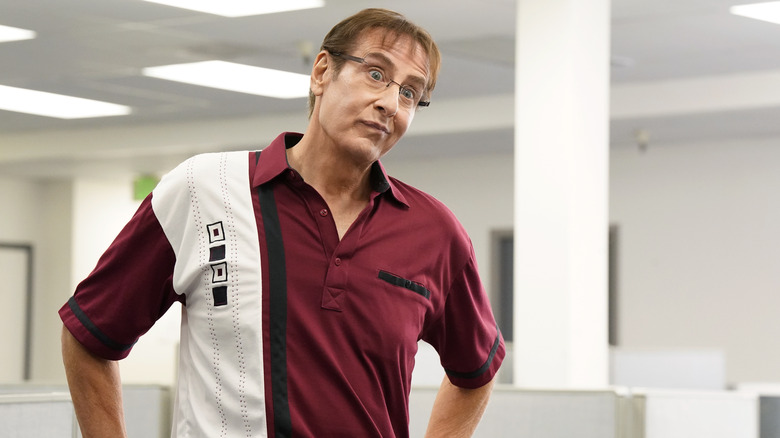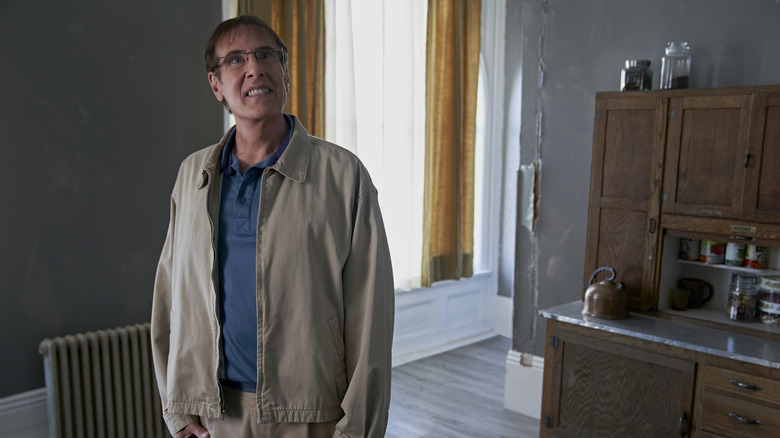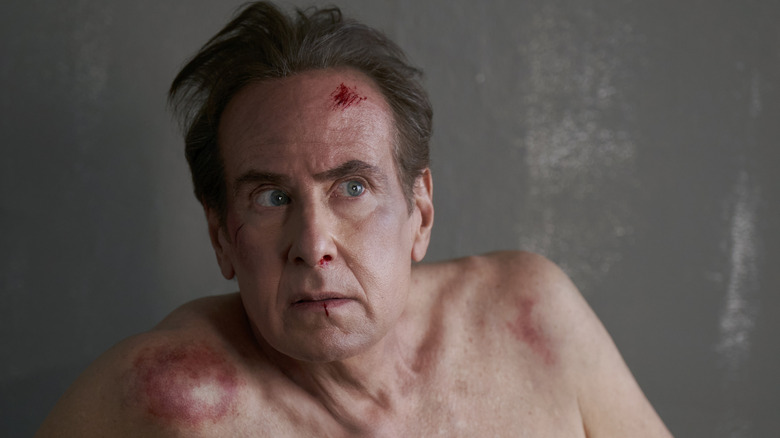Director Jason Woliner's 10-Year Journey To Make Paul T. Goldman, Peacock's Most Unusual Show [Exclusive Interview]
"Paul T. Goldman" is one of the strangest TV shows I've ever seen.
Jason Woliner, the director of "Borat Subsequent Moviefilm," has been working to bring Paul's story to the screen for the past decade, originally envisioning it as a movie but ultimately extending it into a six-episode series on Peacock. Since the rise of streaming, many shows have felt as if they were designed by an algorithm and stretched out with the sole intention of keeping viewers engaged with a platform for as long as possible. Not this one.
Watching "Paul T. Goldman" is an immersive dive into the psyche of an eccentric man with a bonkers life story, and the way Woliner chose to tell that story is endlessly fascinating: He mixes familiar documentary language (talking head interviews, verité-style slice of life moments) with dramatic recreations of scenes from a screenplay Paul wrote based on his own self-published memoir, starring Paul playing himself. The result is an utterly mesmerizing character study that has shades of Nathan Fielder's "The Rehearsal" mixed with Caveh Zahedi's "The Show About the Show," but still manages to feel unique. (Check out the trailer to experience what this actually feels like.)
I spoke with Jason Woliner over Zoom and asked him about this project's odd journey to the screen, capturing authenticity amid all of this artifice, and how he felt about his own appearances on the show.
Note: This interview has been lightly edited for clarity and brevity.
'I needed him to be on board the entire time'
You are ostensibly in charge of this show, but there are moments in the series where Paul seems to overrule you in real time and sort of reshapes the narrative to fit his whim. Do you remember what you were thinking in those moments?
It was an interesting tension, because the show is me telling the story of Paul telling his story. But in order to do it the way I wanted to, I needed him to be on board the entire time, and because, really, what to me was most interesting about this were his choices and telling his story, how he wanted to tell the story, what was important to him, what were interesting details to him, and so on. So part of that involved letting him steer as much as what was possible and really indulging any idea he had, because sometimes it would be really interesting or revealing or funny. The whole idea, really, was to kind of take a camera inside his brain. So that involved just kind of giving him the keys in a lot of ways.
At the same time, this is not a high budget show. We shot the entire thing in 15 days, and we had over a hundred scenes to shoot. So there was a time crunch. There was the mechanics of moving a 80-person crew. So trying to do that and follow his whims where he wanted to do these ideas that would come into his head, there were definitely times — and then you can see it, there are scenes in it that to me were very interesting and funny on paper in terms of what it would explore or reveal about him, and then shooting it on set was brutal. It was really difficult. And I tried to be honest about that in the show and tried to include all of that. Like the scene with the doctor, or there's other scenes where reading it was very interesting and funny and like, "Oh yeah, we've got to shoot that," the scene in the park with the girls. And then while we were there, it was not easy. [laughs] So all that is real.
The idea of shooting this in 15 days, what does that look like?
The 15 days was this summer in May and early June. We shot just three weeks of those dramatized scenes. We had also shot four days of scenes in 2017, and that's a lot of the first episode is this pilot. Then before that, in 2012, I just went to his house with three friends and we just interviewed him. Then I got this company, Caviar, involved. They're a commercial company who were starting a film production wing, and they've done very well since then. They paid for a crew to go film him in Florida. That kind of main interview was in 2014. After that, we flew him out to L.A. to do auditions, and there's a lot of that in the show. And then we did that pilot, and then the pilot didn't go. Sometimes I would go to him. There's a scene in the fourth episode where he's working for an auto insurance company, and that's just me and him. I just went to Florida by myself. I had a camera. I did sound. There's zero people.
So sometimes we'd have a crew of 80 people. Sometimes it would be just me. And then the time within that, obviously I was also working on other things. I did the "Borat" movie, I did TV shows here and there. But all the while, getting the money to do something like this, convincing people to risk money, risk their jobs on a show like this, that's what took 10 years, basically.
It was going to be a movie and we'd say, "Well, it's a documentary, ultimately, but it will cost a little more because of all these reenacted scenes. It'll be more like an independent film, like a narrative film." And they'd say, "Well, who's starring in it?" And I would say, "Well, Paul is starring in it." It's like, click. [Mimes hanging up a phone] So it just took years. And then it's like, "Well, it's so big now. This feels more like a series. This is 10 years. This is the rise of streaming and everything. Okay, it'll be a series." And still, the format was so unusual. It just took many years of steps of convincing people to let me do it, basically.
'I guess the camera's on me now'
The structure of the project is really fascinating to me. And the meta quality allows for what I think are some of the most authentic moments of the whole thing, where the camera catches Paul talking with his co-stars in between takes. How much did you know going in that those were going to be key moments to capture?
When we shot this pilot in 2017, I brought on a friend of mine, this brilliant documentarian named Jason Tippet, who films that kind of fly-on-the-wall style. His documentary style is not so much "throw a camera on your shoulder," but he'll just find a spot and plant the camera and walk away and just kind of roll until something interesting happens. So we decided early on to make him — he's that third camera, he's the part of the process. So sometimes he would just roam around the set and basically follow Paul and be far enough away that people didn't feel like they were on camera. But everyone on set knew that was the deal, that they were miked and we were recording behind the scenes. Then he would just plant and capture interesting things.
From editing the pilot and getting some moments that we really liked there, where [Paul]'s talking about what awards he thinks he'll win, or when he is telling the stand-ins his story, he would just keep telling his story to whoever would listen. There were interesting and funny things about that. We realized that was going to be a very important part of the show, just these kind of quiet moments captured between scenes and between takes.
I know that you have a background in performance. So I'm wondering if you consider the version of you that we see in this show to be a character that you're playing, or if that's an accurate representation of what it was like to be you behind the scenes of this?
It varies scene to scene. I was aware that there were cameras on set recording everything. At the same time, I was so focused on just making the day because we had so much to film, and I wanted to allow for Paul to do whatever he wanted, talk between takes, talk to the camera, whatever. So mostly, I was focused on just getting the scenes and letting Jason Tippet find whatever he could offscreen. And so sometimes I was aware, "Oh, okay, I guess the camera's on me now." Most of the time I would, like in that second episode, wave him off me. I really resisted being in it for the most part. And there's stuff in there, especially in that fifth episode, where I was fully not aware I was on camera, where you see me really struggling. I saw it in the edit. I was like, "Yeah, that's good footage." But I was not performing at all. I was not aware at all that I was on camera, and it turned out to be some good stuff, I thought.
The first three episodes of "Paul T. Goldman" will premiere on Peacock on January 1, 2023, with one new episode arriving weekly for the following three weeks.


